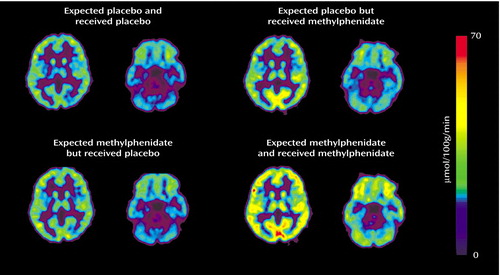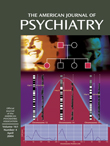Drug Dependence and Addiction, III: Expectation and Brain Function in Drug Abuse
The reinforcing effects of drugs of abuse represent a complex interaction between pharmacological effects and conditioned responses. These nonpharmacological variables shape the expectation of the drug effects, which in turn modulates the responses to the drug. In drug abusers, the subjective responses to a drug are more pleasurable when the person expects to receive the drug than when they do not. To explore the neural basis of this effect, we examined the response of brain glucose utilization to intravenous methylphenidate in cocaine abusers under distinct conditions of expectation and no expectation. As seen in the Figure, four conditions were tested: 1) subjects expecting methylphenidate and receiving methylphenidate, 2) subjects expecting methylphenidate but receiving placebo, 3) subjects expecting placebo but receiving methylphenidate, and 4) subjects expecting placebo and receiving placebo. Methylphenidate significantly increased whole brain glucose metabolism compared with the placebo condition, but that increase was augmented by approximately 50% when methylphenidate was expected relative to when it was not. The largest increases from methylphenidate in all conditions of drug treatment occurred in the cerebellum, occipital cortex, and thalamus. In each of these areas, expectation of methylphenidate increased regional neuronal activations. Relative decreases after methylphenidate occurred in limbic brain regions (ventral striatum, parahippocampal gyrus, and insular cortex) and frontal cortex, and the magnitude of these decreases was not affected by expectation. Behaviorally, the self-reports of “drug high” were greater for methylphenidate when it was expected than when unexpected, by approximately 50%. The interpretation of these data is that expectation enhances the pharmacologic effects of methylphenidate, through amplifying dopamine and norepinephrine signals generated by blocking dopamine and norepinephrine transporters. Indeed, the notion that expectation can emulate drug-induced brain effects may explain a “placebo” effect. The reinforcing effects of drugs are not just a function of their pharmacological effects but also of the expectation of their actions.
Address reprint requests to Dr. Tamminga, UT Southwestern Medical Center, Department of Psychiatry, 5323 Harry Hines Blvd., #NC5.914, Dallas, TX 75390-9070; [email protected] (e-mail).

From Volkow ND, Wang GJ, Ma Y, Fowler JS, Zhu W, Maynard L, Telang F, Vaska P, Ding YS, Wong C, Swanson JM: Expectation enhances the regional brain metabolic and the reinforcing effects of stimulants in cocaine abusers. J Neurosci 2003; 23:11461–11468.



